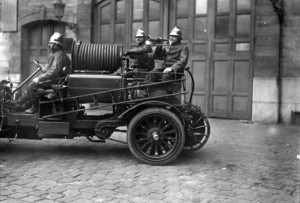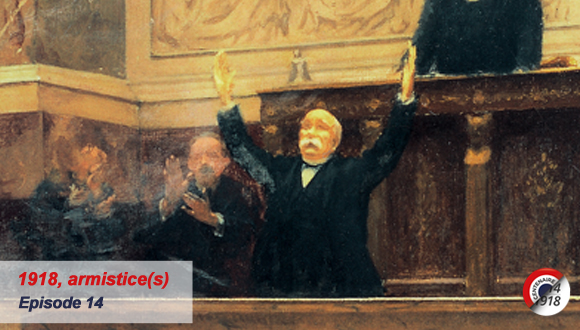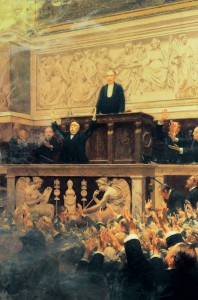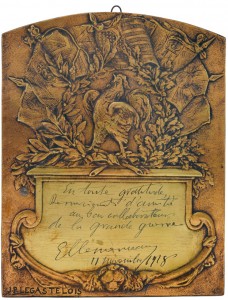The announcement of the signature of the armistice by Georges Clemenceau at the Palais Bourbon. Oil on canvas by René Rousseau Decelle. © Paris, musée Clemenceau
 Premier-Secours à la Caserne de Château-Landon, avec un clairon doublant la siréne fixe pour alerter la During a “General alert, sound the alarm”, fire trucks rode through the busiest thoroughfare in Paris, sounding “At attention” either by warning horns or a bugle. Then the population was informed that any danger had subsided by the ‘La Berloque’ bell © Paris, musée des pompiers.
Premier-Secours à la Caserne de Château-Landon, avec un clairon doublant la siréne fixe pour alerter la During a “General alert, sound the alarm”, fire trucks rode through the busiest thoroughfare in Paris, sounding “At attention” either by warning horns or a bugle. Then the population was informed that any danger had subsided by the ‘La Berloque’ bell © Paris, musée des pompiers.
Plate to the glory of Victory with thanks from Georges Clemenceau, by Jules Prosper Legastelois (1855-1931). On the other side, the Gallic cock crows, standing proudly on oak and laurel branches. Around them are the Allied flags. Below, the inscription: “In all gratitude / friendly thanks / to the fine hand / in the Great War / G. Clemenceau / 11 November 1918. “
The Armistice is officially announced
“People have written that when the armistice was announced, I could not hold back my tears. I make no secret of that. The sudden shift from the gloomy ardour of battle to sudden tumults of hope can undermine the foundations of a man’s balance, is assured as he may seem.”
Georges Clemenceau, Grandeurs et misères d’une victoire, published in 1930, after his death.
From 11 am
“The question is asked from all sides; […] Some people are asking that as soon as the news is announced, military bands spread throughout Paris and that the victory be greeted by The Marseillaise. Others prefer bells: that all church bells set in motion at the same time! It must be acknowledged that the firefighters’ chant, La Berloque, is also very much in demand. […] But above all, no sirens! […] What an abominable music that is!” writes Le Figaro of 11 November 1918.
The announcement of the signature of the armistice spread widely already that morning. Around 11 a.m., the cannons thunder on the Invalides Esplanade, bells ring throughout Paris and throughout France. The crowd runs through the cobblestone streets, the soldiers march…
At the Palais Bourbon
Already in the morning, a large audience was waiting near the Palais Bourbon gates, which were to open only at 1:30 p.m.; it was a feat to secure a spot in the Chamber. Around 4 p.m., Georges Clemenceau, President of the Council and Minister of War, arrived at the Palais Bourbon. Having let the applause subside, he began reading the Armistice Convention. He then added: “In the name of the French people, on behalf of the government of the French Republic, the salvation of France one and indivisible, to Alsace and Lorraine regained. As well, honour to our great fallen who delivered this victory upon us!». He later made the same speech in the Senate, where an extraordinary session had been convened, in recognition of the importance of the armistice as an event.




Ajouter un commentaire